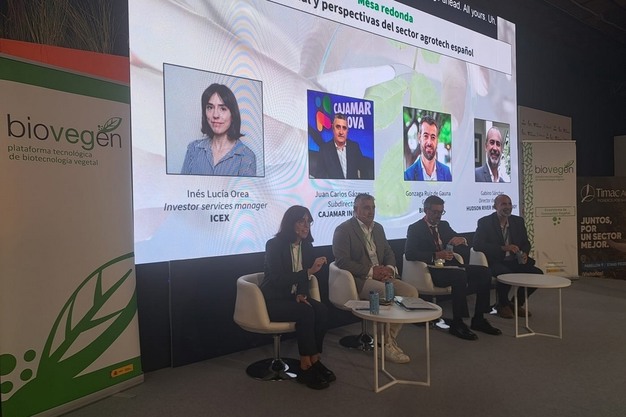The debate between those responsible for the document “Mapping the agrotech ecosystem in Spain” was the main attraction of the Biotech Congress, promoted by Biovegen, during the latest edition of Fruit Attraction. Around 300 researchers and entrepreneurs filled the Fruit Forum, where some of the conclusions of this document, promoted by ICEX and Cajamar, were presented, a real audit of the Spanish technology industry dedicated to agriculture. Its great potential was on display: the aforementioned work has identified a dense network made up of 850 start-ups – located in Andalusia (181), Catalonia (126), Valencia (110) and Madrid (109); a powerful research platform with 50 specialised universities, 20 mixed or private technology centres and parks, at least 24 sectoral and/or regional clusters, 7 technology platforms – such as Biovegen itself, dedicated to biotechnology -, regional innovation hubs and incubators that help companies to be born and grow from their first patents or plant varieties.
 © Biovegen
© Biovegen
Spain boasts leading industries such as olive oil, citrus, and pork, serving as the “engines” of a robust agri-food sector that exports nearly 20% of the country’s goods. This sector has been increasing productivity at a 0.9% annual rate, outpacing its regional counterparts. The report highlights significant interest from seed industry giants, including Bayer, Syngenta, Rijk Zwaan, and Sakata, many of which have their headquarters in Spain and are forming collaborations with local firms. Additionally, venture capital has fueled numerous mergers and R&D initiatives over the past two years (2024 and 2025) through funds and SCRs. Gonzaga Ruiz de Gauna, director of Biovegen, characterizes the current Spanish agrotech scene as thriving: ‘Today, we have talent and expertise; we attract multinationals and foreign investment. As this sector matures, we could become a major exporter of agro-technology.”
The roundtable discussion was moderated by Inés Lucía, Investor Manager at ICEX. Juan C. Gázquez, deputy director of Cajamar Innova and a representative of the entities promoting the report, participated alongside Gabino Sánchez, business director of Hudson River Biotechnology (HRB) from the Netherlands. HRB is one of the companies specializing in CRISPR technology that has chosen to operate in Spain. Also attending was Ruiz de Gauna from Biovegen. Gázquez highlighted the main expertise areas for over 850 Spanish startups: nearly 30% focus on precision agriculture and livestock, 17% on managing these sectors, 15% on robotics and mechanization, and about 12% on biotechnology.
The latter sector is anxiously awaiting the EU’s regulatory proposal, which began discussions in 2023 but remains in the trilogue stage, involving the European Parliament, the Council, and the European Commission. This proposal aims to replace the restrictive GMO regulations with more flexible rules for New Genetic Editing Techniques (NGT). To prepare for its growth, focused on plant breeding methods like CRISPR, Amparo Monfort from the Centre de Recerca en Agrigenòmica (CRAG), a prominent Spanish research consortium, shared updates on the nGENIA project. This group of experts is advising the Ministry of Agriculture on NGT development and is organizing meetings with investors.
Lack of incentives, disconnection, atomization, and bureaucracy
The agrotech industry faces several uncertainties. Sánchez, an executive at Dutch biotech firm HRB, highlighted that Spain remains attractive due to its lower labor costs—19% below the EU average—but said it lacked measures to “retain or attract talent” (unlike the Netherlands, which offers large exemptions for five years for certain profiles) and to reduce the tax burden on R&D investments, which are highly subsidised there. Gázquez from Cajamar added that, despite progress, “we still have an unstructured research system, lacking sufficient interconnection, and a small, fragmented business sector,” urging measures to address both issues.
The director of Biovegen—along with the other participants at the table—concluded that, besides the privileged natural, geographical, and climatic conditions for Spanish industry, “agrotech cannot continue to survive on lower wages than in the EU because it’s already competing in this market with other origins, to the south of the Mediterranean or Latin America, with much cheaper production. R&D is our way of generating value.” He referred to the Spanish regulatory framework to provide tax incentives for these investments, stating, “Either it is not known or it involves too much bureaucracy, or probably both.”
AI, digitization, and edited Spanish crops
The congress was opened by Ana Castro, Vice President of Innovation and Transfer at CSIC, and the event’s host, José Pellicer, President of Biovegen. Pellicer introduced many of the points that would be highlighted in later presentations: “We have three disruptive technologies that are accelerating progress and mutually reinforcing: artificial intelligence, process digitization, and advanced genomic techniques. Agriculture and food industries cannot, and I believe will not, ignore this ongoing revolution that has already started.”
Jorge Lozano, Francisco Bermúdez, and Pablo Gutiérrez presented three successful cases of technology transfer through public-private consortia involving these technologies. Jorge Lozano from IBMCP (UPV-CSIC) presented the use of drugs to enhance drought tolerance. Francisco Bermúdez, CEO of Beyond Seeds, shared results from the GO Biodif operational group, focusing on nanofertilisers (nutrients and bioactive compounds) for table olives and olive oil. Pablo Gutiérrez from Viveros Integrales El Ejidillo discussed the GO Simbioliva project, which aims to revalue alperujo (olive pomace).
Additionally, José M. Mulet, a researcher at IBMCP (UPV-CSIC, Valencia), introduced one of Spain’s most advanced breeding projects using CRISPR, which involves developing broccoli varieties resistant or tolerant to water scarcity, with improved taste and higher amino acid content. Although the legislation has not yet been enacted, these projects are already in the field trial phase. Three other projects include two maize initiatives in Aragon and Andalusia, as well as a tobacco plant in Valencia engineered to produce anatabine instead of nicotine, which offers anti-inflammatory and neuroprotective benefits.
The event ended with a speech by Carlos de la Cruz, Director of Technology at CDTI Innovation.
For more information:
Biovegen. Plataforma Tecnológica de Biotecnología Vegetal
Parque Científico de Madrid. C/ Faraday 7
Campus de Cantoblanco. 28.049 Madrid.
Tel: (+34) 917 710 272 / (+34) 627 428373
https://biovegen.org/
Source: The Plantations International Agroforestry Group of Companies
